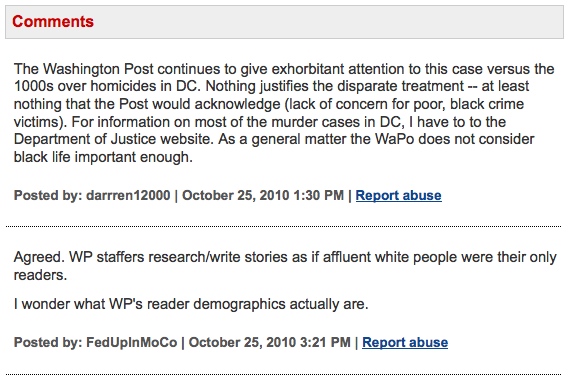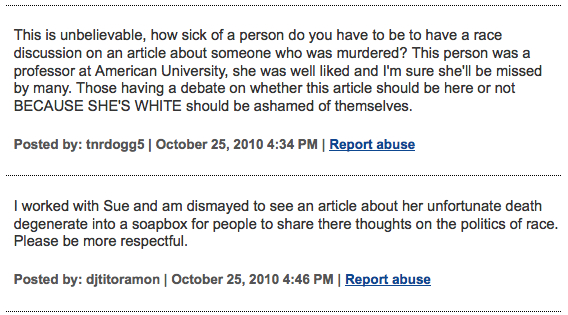Race and Class, everywhere.
At some point between Sunday evening and Monday morning, the body of American University Professor Sue Marcum was discovered by a friend who had been concerned about her. Professor Marcum had taught at the business school since 1999. This morning, police got a major break in her case when Marcum’s stolen jeep was noticed by a “a license plate recognition sensor” (more on those, here):
Police went to Benning Road and attempted to stop the Jeep, Bonilla said, then gave chase when Hamlin allegedly tried to drive away. The Jeep crashed into a crosswalk signpost at the intersection of New York Avenue and M Street NW. Hamlin, who police said lives in Northwest Washington, was taken into custody and charged with unauthorized use of a vehicle and felony fleeing.
I learned everything I know about Professor Marcum’s death through the Washington Post; after feeling shock and sadness over this violent, awful crime, what struck me about this story yesterday was how quickly readers turned to race, when discussing the murder. Seven of the first eight comments are solely about race, class and the Post’s coverage of homicide. Here are the first two:

The ninth comment, left by “icarus0720au” is the first to address the loss of this beloved member of the AU community:

Further down, readers who knew may or may not have known Professor Marcum were upset that the comments were about race vs. loss:

http://voices.washingtonpost.com/crime-scene/montgomery/woman-dead-in-moco-home-foul-p.html?hpid=newswell
I spent six years helping to build an online community for the South Asian diaspora where I was particularly vocal about the need for courtesy, compassion and respect. I used to remind our readers that whenever we blogged about someone who had died, friends and family of the deceased would inevitably find that post whether soon after their loss or years later. I’d remind people to remember that fact when choosing their words. But that was a unique, niche space and not the Washington Post. Our audience was tiny, and more targeted in comparison.
I understand the desire to express pain and sadness at a terrible loss; I also understand that others who are not connected to the tragedy may choose to focus on larger problems which plague society, whether such commentary is welcome or not. The question is, where is it appropriate to hash out such issues? Who has the right to comment threads? Or perhaps, who has *more* of a right to them, if such a thing could be determined? If you can’t talk about perceived inequality in the Post’s news coverage at the Washington Post, where can you discuss it?
I hope that DCentric is able to become that rare space where informed conversation about difficult topics occurs. We’re just starting out, so at this point, just a conversation or, you know, a comment or two would be great…but down the line, as more people feel comfortable talking to each other here, I hope that we can be a safe space for making sense of it all, a place which is defined by thoughtful exchanges and mutual respect.
-
frustrated





